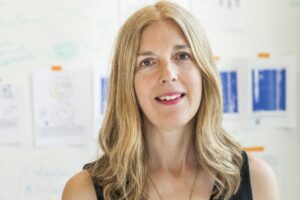22nd Perl-UNC Neuroscience Prize Recipient
Past winners include six scientists who went on to win the Nobel Prize.
Leslie B. Vosshall, PhD, the Robin Chemers Neustein Professor of Neurogenetics and Behavior at The Rockefeller University, will receive the Perl-UNC Neuroscience Prize for her work on receptors that drive host-seeking behavior in the mosquito.

The UNC School of Medicine has awarded the esteemed 22nd Perl-UNC Neuroscience Prize to Leslie B. Vosshall, PhD, from The Rockefeller University and the Howard Hughes Medical Institute, for the “discovery of receptors involved in mosquito host-seeking behavior.”
Dr. Vosshall will visit Chapel Hill on March 14, 2024, to receive the prize – a $20,000 award – and give a lecture on her work at the UNC School of Medicine.
Born in Lausanne, Switzerland, Vosshall spent her childhood in Switzerland, Austria, and Germany before moving to New Jersey at the age of 8. In 1987, she received a BA in biochemistry from Columbia University. She then received a PhD from Rockefeller University in 1993 while working with Michael Young, an awardee of the 2017 Nobel Prize. She later returned to Columbia, training as a postdoctoral fellow in the lab of future Nobel laureate Richard Axel. He and Linda Buck were awarded the Perl-UNC Neuroscience Prize in 2002 and a 2004 Nobel Prize in Physiology or Medicine for their discoveries on odor receptors and the organization of the human olfactory system.
Vosshall’s lab uses genome-editing tools to understand how Aedes aegypti — the mosquitoes that spread Zika, dengue, and yellow fever — use their senses to hunt and feed on human hosts. More specifically, they seek to understand why these mosquitos are more attracted to some humans than others and how insect repellents, such as DEET, work to prevent host-seeking and biting behavior.
“Dr. Vosshall has long inspired me and my research. While in Dr. Michael Young’s lab, Leslie published an important paper on the fruit fly circadian clock gene called Timeless. I was a graduate student at the time and cloned the mammalian version of Timeless. While working on this project, I read that paper of hers so many times, it’s still imprinted on me,” said Mark Zylka, PhD, chair of the Perl-UNC Neuroscience Prize committee and director of the UNC Neuroscience Center.
“Dr. Vosshall changed research directions several times over the course of her career, each time making impactful discoveries that redefined our understanding of the nervous system. Her recent work helped to address the long-standing question every human since the dawn of time has asked while being swarmed and bitten by mosquitos—why me? Dr. Vosshall’s work paved the way for new products to deter these nasty pests that spread deadly disease.”
In 2014, Vosshall and colleagues tapped into the specific gene that drives mosquitoes to prefer humans over other animals. They found mosquitos have an odor-detecting gene, named AaegOr4, in its antennae that recognizes sulcatone, a colorless component of human odor that smells like citrus.
Her lab made yet another discovery in 2019. They discovered a co-receptor, Orco, in mosquitoes that is responsible for their preference for humans over non-human animals. The same study revealed that DEET repels mosquitoes through their sense of smell and physical touch. Previous to her work, researchers did not have an exact answer as to how, or why, DEET affects mosquitoes.
Vosshall’s work is not only promising for preventing the spread of deadly mosquito-borne viruses, but it also has the potential to aid in human olfaction. In an effort to comprehend how smells influence human behavior, the lab studied how certain odor receptor genes play a role in cognitive and physiological reactions to smells.
“I am thrilled beyond measure to have the work of my group recognized by this important award,” said Vosshall, who is the Robin Chemers Neustein Professor of Neurogenetics and Behavior at The Rockefeller University and Vice President and Chief Scientific Officer of the Howard Hughes Medical Institute. “Many of my scientific heroes – and heroines – are past awardees and I am so honored to be counted among them.”
About the Perl-UNC Neuroscience Prize
The Perl-UNC Neuroscience Prize, established in 2000, is named after former UNC professor Edward Perl, MD, who discovered that a specific type of sensory neuron responded to painful stimuli and was the first president of the Society for Neuroscience. Dr. Perl passed away in 2014.
The prize recognizes researchers for outstanding discoveries and seminal insights in the broad field of neuroscience, while celebrating the strength of the neuroscience research program at the University of North Carolina at Chapel Hill.
Along with chair Mark Zylka, PhD, the W.R. Kenan Distinguished Professor of Cell Biology and Physiology at the UNC School of Medicine, the Perl-UNC Neuroscience Prize selection committee consists of: David Anderson, PhD, the Seymour Benzer Professor of Biology at Caltech; Ben Philpot, PhD, Kenan Distinguished Professor of Cell Biology and Physiology and Associate Director of the UNC Neuroscience Center; Catherine Dulac, PhD, the Higgins Professor of Molecular and Cellular Biology at Harvard School of Medicine, Gwenn Garden, MD, PhD, the H. Houston Merritt Distinguished Professor and Chair of Neurology at the UNC School of Medicine, Liqun Luo, PhD, the Ann & Bill Swindells Professor of Biology at Stanford University, and Beth Stevens, PhD, associate professor of neurology at Harvard Medical School.
Media contact: Kendall Daniels, Communications Specialist, UNC Health | UNC School of Medicine